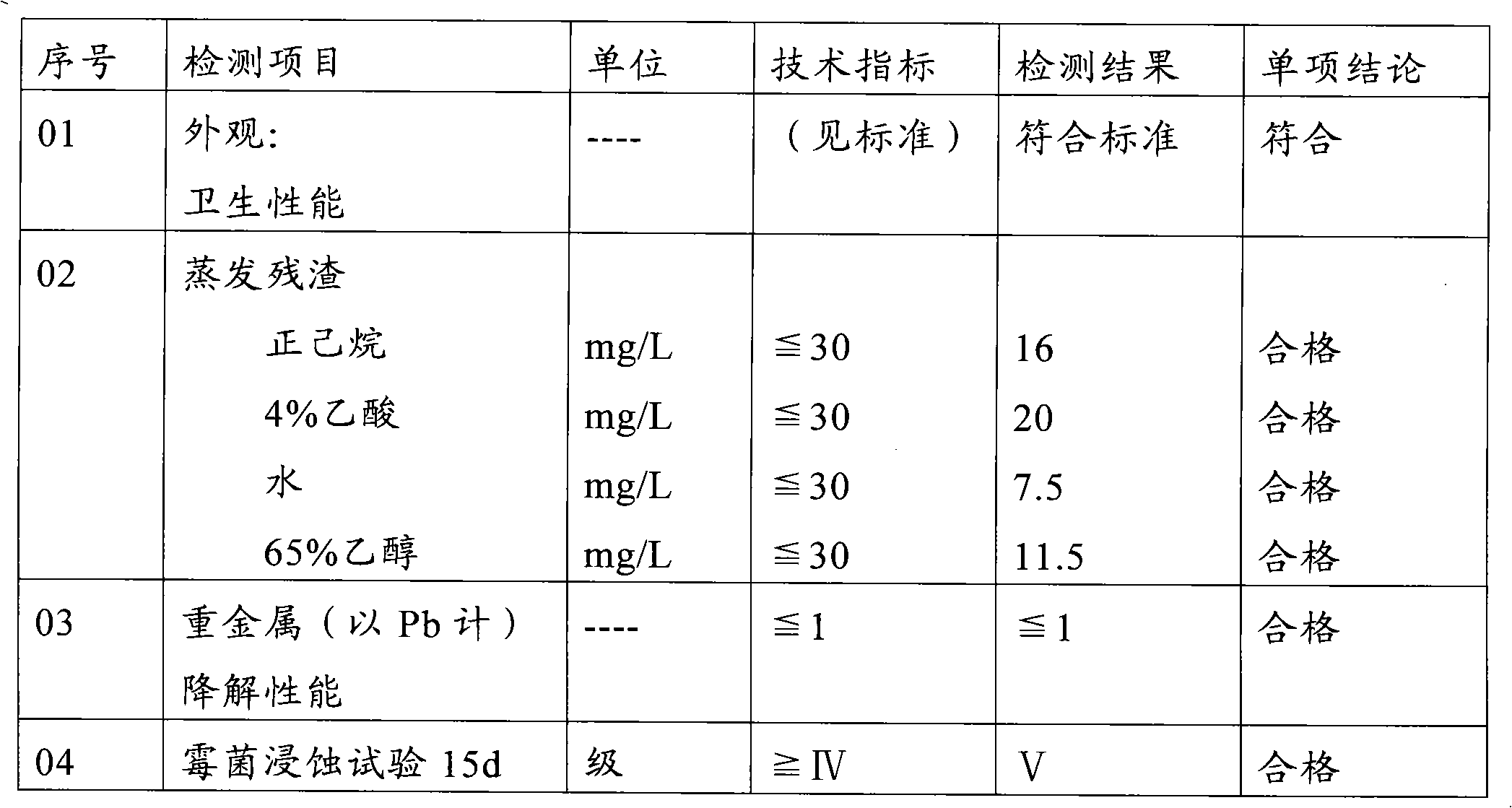Starch-based thermoplastic biodegradable material and preparation method thereof
A biodegradable material and biodegradable technology, applied in the field of starch-based thermoplastic biodegradable materials and their preparation, can solve the problems of biodegradable performance and unsatisfactory mechanical processing performance, and achieve excellent flexibility and mechanical properties, as well as extreme oil resistance Good, outstanding effect at low temperature
- Summary
- Abstract
- Description
- Claims
- Application Information
AI Technical Summary
Problems solved by technology
Method used
Image
Examples
Embodiment 1
[0035] Take 70kg of cornstarch, add 0.26kg of adipic acid, 0.30kg of 1,2-propanediol, 1.5kg of tributyl citrate, 0.35kg of maleic anhydride, 0.70kg of magnesium stearate, 0.7kg of fatty alcohol (C12-C14 alcohol) kg, 0.35 kg of 2,6-di-tert-butyl-4-cresol (food grade), 1.2 kg of alkyl phosphate potassium salt (PK), and 1.5 kg of caprolactam were modified in the aforementioned modified high-speed mixer for 20 minutes.
[0036]Raise the temperature to 100°C to 145°C, add 20kg of polycaprolactone, 3kg of soybean fiber and quickly mix for 15 minutes to graft, cool down and discharge to obtain a degradable starch base material. Add the above-mentioned base material to a parallel twin-screw extruder at 200°C under the action of screw shear force to carry out plasticization and polymerization, and extrude to obtain a white sheet (thickness 0.25mm) in one step.
Embodiment 2
[0038] Take 80kg of potato starch, add 0.32kg of sebacic acid, 0.40kg of 1,2-butanediol, 1kg of methyl acrylate, 1kg of ethyl acrylate, 0.4kg of maleimide, 0.90kg of calcium stearate, stearic acid Zinc 0.25kg, C16~C18 alcohol 1.2kg, 2,6 di-tert-butyl-4-cresol 0.4kg, alkyl phosphate potassium salt (PK) 0.5kg, antistatic softener (AM-A) 1.3kg, 1.2kg of hexylene bisstearamide and 1.0kg of caprolactam were modified in a high-speed mixer for 25 minutes.
[0039] Raise the temperature to 120°C to 150°C, add 12.5kg of polycaprolactone and 12.5kg of polylactic acid and quickly mix for 10 minutes to carry out grafting, cool down and discharge to obtain a degradable starch base material. Add the above-mentioned base material to a twin-screw extruder at 70°C to 240°C, plasticize and polymerize under the action of screw shear force, and extrude to obtain a white sheet (thickness 0.45mm) in one step.
Embodiment 3
[0041] Take 80kg of tapioca starch, add glutaric acid 0.35kg, 1,3-butanediol 0.55kg, methyl acrylate 1.25kg, butyl stearate 1.25kg, maleic anhydride 0.45kg, calcium zinc composite stabilizer 0.8kg, Glycerol 1kg, 2,6 di-tert-butyl-4-cresol 0.35kg, octadecyl dimethyl hydroxyethyl quaternary ammonium nitrate (SN) 1.2kg, caprolactam 1kg, octadecylamide 0.8kg at high speed Modified in the mixer for 30 minutes.
[0042] Raise the temperature to 100°C to 140°C, add 20kg of polylactic acid and 5kg of bamboo charcoal cellulose fiber and quickly mix for 15 minutes to graft, cool down and discharge to obtain a degradable starch base material. Add the above-mentioned base material to the parallel twin-screw extruder (the device in the application number 201020139563.6) at 160°C under the action of the shear force of the screw, plasticize and polymerize, and extrude to obtain a white sheet (with a thickness of 0.75mm).
PUM
| Property | Measurement | Unit |
|---|---|---|
| Thickness | aaaaa | aaaaa |
| Thickness | aaaaa | aaaaa |
| Thickness | aaaaa | aaaaa |
Abstract
Description
Claims
Application Information
 Login to View More
Login to View More - R&D
- Intellectual Property
- Life Sciences
- Materials
- Tech Scout
- Unparalleled Data Quality
- Higher Quality Content
- 60% Fewer Hallucinations
Browse by: Latest US Patents, China's latest patents, Technical Efficacy Thesaurus, Application Domain, Technology Topic, Popular Technical Reports.
© 2025 PatSnap. All rights reserved.Legal|Privacy policy|Modern Slavery Act Transparency Statement|Sitemap|About US| Contact US: help@patsnap.com

